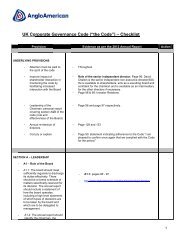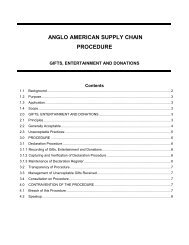pdf [ 1.5MB ] - Anglo American
pdf [ 1.5MB ] - Anglo American
pdf [ 1.5MB ] - Anglo American
Create successful ePaper yourself
Turn your PDF publications into a flip-book with our unique Google optimized e-Paper software.
Scaw Metals Group Sustainable Development Report 2005 35<br />
Recycling Initiatives<br />
General waste recycling is a priority and the group recycled<br />
227 361kg of paper and plastic during the course of 2005.<br />
Steel is regarded as the most recycled material in the world.<br />
The group has contributed to this statement of fact by<br />
having recycled 580 937 tonnes of scrap steel in 2005.<br />
Owing to space limitation for waste disposal, the principle<br />
of sustainable development and strict legislative<br />
requirements, the recycling of process waste has become<br />
strategically important.<br />
A phased approach to process waste has been adopted.<br />
The initial focus is on problematic waste streams, both in<br />
terms of viable recycling options and in terms of the quantities<br />
produced. The char recycling project will entail the recycling<br />
of fresh arising char from the directly reduced iron plant for<br />
use in the manufacture of bricks. Research and development<br />
stages of the project have been finalised, and plant<br />
establishment has commenced.<br />
Waste Recycling<br />
600000<br />
500000<br />
400000<br />
300000<br />
200000<br />
100000<br />
0<br />
Paper (kg)<br />
Plastic (kg)<br />
Scrap steel (tonne)<br />
2004<br />
66684 208931 482431<br />
2005 43543 183817 580937<br />
Stakeholder Involvement and Information Transfer<br />
The group continued to ensure constructive dialogue with<br />
stakeholders by convening annual forums and engaging<br />
with community members individually on an ad hoc basis.<br />
Community development forms an integral part of the<br />
Rietfontein remediation project. The plants for the landfill<br />
were produced by Modula Qhowa Community nursery as<br />
part of a technology transfer project. Seeds and cuttings<br />
of 72 species of local plants were provided and were<br />
‘designed’ specifically for the site (that is, local tolerant<br />
ecotypes from Ekurhuleni, Gauteng), and have been<br />
specifically inoculated with a South African heterogeneous<br />
mixture of highly mycorrhizal polluted soil from around the<br />
landfill in Ekurhuleni.<br />
Refer to the Community Engagement<br />
section of this report.<br />
Continual Improvement<br />
Audits<br />
Internal and external audits based on the ISO 14001<br />
standard are conducted on a regular basis to ensure that<br />
operating units within the group are on par with regard to<br />
environmental management.<br />
Objectives 2006<br />
• Overall reduction in water consumption (0.5%) per<br />
tonne of product produced, linked with water re-use<br />
initiatives.<br />
• Overall reduction in total energy consumption (0.4%)<br />
per tonne of product produced, linked with energy<br />
efficiency initiatives.<br />
• Overall reduction in greenhouse gas emissions linked<br />
with the total energy consumption targets.<br />
• The newly-acquired company, AltaSteel, to achieve<br />
ISO 14001:2004 certification.<br />
• Continued waste recycling and minimisation, with the<br />
target being a 30% reduction in process waste to<br />
landfill.


![pdf [ 1.5MB ] - Anglo American](https://img.yumpu.com/34179502/37/500x640/pdf-15mb-anglo-american.jpg)
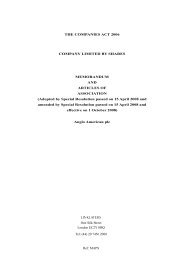
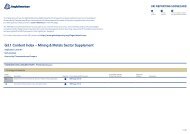
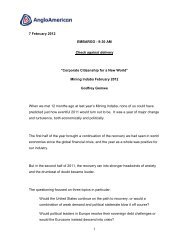
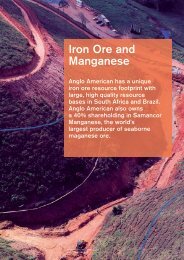
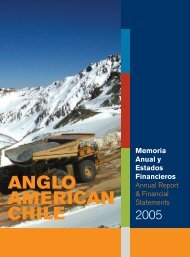
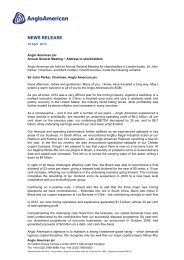
![English PDF [ 189KB ] - Anglo American](https://img.yumpu.com/50470814/1/184x260/english-pdf-189kb-anglo-american.jpg?quality=85)
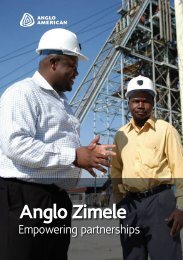

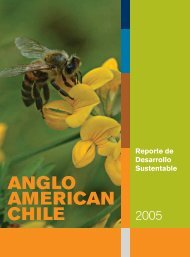
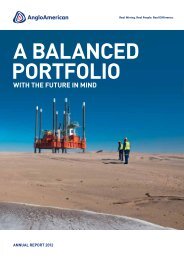
![pdf [ 595KB ] - Anglo American](https://img.yumpu.com/49420483/1/184x260/pdf-595kb-anglo-american.jpg?quality=85)
![pdf [ 1.1MB ] - Anglo American](https://img.yumpu.com/49057963/1/190x240/pdf-11mb-anglo-american.jpg?quality=85)
